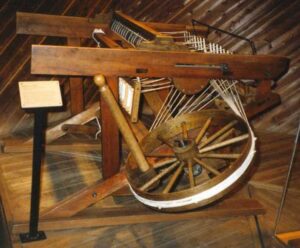 I had the good fortune to spend a few days in Colonial Williamsburg, where I wandered into the shop for weaving and spinning. The interpreter on duty explained, while carding and spinning wool, how automated Spinning Jennies replaced the cottage-industry spinning wheels, leading to lots of superfluous spinsters.
I had the good fortune to spend a few days in Colonial Williamsburg, where I wandered into the shop for weaving and spinning. The interpreter on duty explained, while carding and spinning wool, how automated Spinning Jennies replaced the cottage-industry spinning wheels, leading to lots of superfluous spinsters.
And thus we continue my post-retirement exploration of words associated with old folks.
Her story got my ears buzzing; I explained about this blog and wondered how the term came to be associated with older, never-married women who also may have never spun yarn. The interpreter didn’t know for certain, but she hazarded a guess that the number of unemployed spinsters in the late 18th century led to the term being used generally for women who were seen as of little use socially. That possibility would follow a long history of legal use. The OED entry notes how in English Common Law “Use of the occupational term to indicate a woman’s marital status appears to have been motivated by the fact that many unmarried women and girls were employed in spinning,”
This makes sense; a spinsters’ hours during six-day working weeks were quite long; we were told that it took 12 women working at wheels to supply a single loom. Would they have time to marry?
In the etymology of out word, one of the longest I’ve encountered so far at the OED, The writers complicate matters. They indicate that “spinster is applied in a number of legal and official documents of the late 16th and 17th centuries to women who are also described as wives and appear to be of high social rank.” Whatever the tangled skein (there’s another metaphor) of history here, when did the shift to an older woman occur?
By the early 18th Century, a word with a somewhat murky legal meaning had taken on a negative connotation, as an unmarried woman “who has remained single beyond the typical age for marriage, often stereotypically characterized as prim and fussy or as lonely, childless, and resentful.”
There the meaning has remained, for 200 years. The word appears rarely today, its frequency of use in steady decline since 1950. The term is considered offensive; rightly so, but the drift of meaning from profession to insult does fascinate.
We may never know why this shift to an insulting meaning occurred. Today, on the other hand, we occasionally hear of press secretaries or PR folks called “spinsters,” who try to put a positive spin upon otherwise bad news.
If you think of any words or metaphors to share with the community in 2025, send them to me at jessid -at- richmond -dot- edu or by leaving a comment below.
See all of our Metaphors of the Month here and Words of the Week here.
Image of Spinning Jenny courtesy of Wikipedia